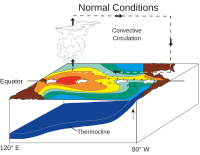
Photo from wikipedia
In this paper, we investigate the reconstruction of time-correlated sources in a point-to-point communications scenario comprising an energy-harvesting sensor and a Fusion Center (FC). Our goal is to minimize the… Click to show full abstract
In this paper, we investigate the reconstruction of time-correlated sources in a point-to-point communications scenario comprising an energy-harvesting sensor and a Fusion Center (FC). Our goal is to minimize the average distortion in the reconstructed observations by using data from previously encoded sources as side information. First, we analyze a delay-constrained scenario, where the sources must be reconstructed before the next time slot. We formulate the problem in a convex optimization framework and derive the optimal transmission (i.e., power and rate allocation) policy. To solve this problem, we propose an iterative algorithm based on the subgradient method. Interestingly, the solution to the problem consists of a coupling between a 2-D directional water-filling algorithm (for power allocation) and a reverse water-filling algorithm (for rate allocation). Then, we find a more general solution to this problem in a delay-tolerant scenario where the time horizon for source reconstruction is extended to multiple time slots. Finally, we provide some numerical results that illustrate the impact of delay and correlation in the power and rate allocation policies, and in the resulting reconstruction distortion. We also discuss the performance gap exhibited by a heuristic online policy derived from the optimal (offline) one.
Journal Title: IEEE Transactions on Wireless Communications
Year Published: 2017
Link to full text (if available)
Share on Social Media: Sign Up to like & get
recommendations!